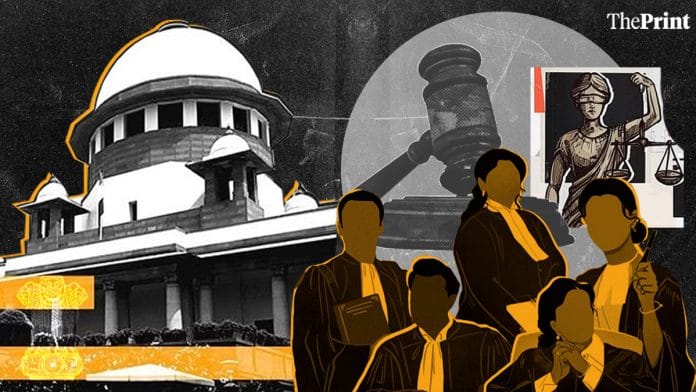New Delhi: The Supreme Court Thursday said that the drafting of arbitration clauses in commercial agreements left much to be desired, lamenting the “wilful wastage” of judicial time caused by such poorly drafted clauses.
Asserting that courts have indulged such cases for far too long and should, instead, throw them out, a bench of justices Surya Kant and N. Kotiswar Singh urged the courts in the country to “invoke their suo motu powers in appropriate cases” where legal firms or counsel design arbitration clauses that deliberately mislead and misguide.
The bench added that not so far from now, “personal liability” would be assigned for such unscrupulous acts, with the harshest punitive measures sanctioned against the actors.
Several lawyers ThePrint approached, however, called the court statements “excessive”, adding that they needed a careful look. For this story, ThePrint spoke to legal experts on what the court meant and what the lawyers made of it.
The division bench said it was high time the arbitration clause wording was of “piercing precision” and clarity and not couched in ambiguous phraseology.
Taking the opportunity to advise the legal fraternity against engaging in practices that resulted in a “criminal wastage” of precious court time, the division bench said the courts must unwaveringly tend towards “rejecting shoddily drafted clauses at the very threshold”.
Explaining how this was not the first time that the Supreme Court had struck down a clause dressed up as an arbitration albeit lacking its core elements, Anuj Bahukhandi, Partner, Tuli & Co, told ThePrint, “In SMS AAMW Tollways (2019), it (court) drew the line between a departmental review by a government officer, and genuine arbitration.”
According to Bahukhandi, the current court ruling has built a precedent and gone one step further by calling such drafting practices a “criminal wastage of judicial time”.
“Unfortunately, you do get to hear about parties spending nearly a decade litigating on just the method or procedure of dispute resolution while their actual dispute goes unaddressed,” he said. “As for us, we regularly advise clients to get their arbitration clauses correctly reviewed since we have various ‘standard’ templates or boilerplate clauses pushed by counterparties on many occasions.”
How Bar views the verdict
Trilegal Counsel Aubert Sebastian told ThePrint that the current ruling in the South Delhi Municipal Corporation vs SMS Ltd. case required careful consideration because the court speaks of invoking suo motu powers and suggests accruing personal liability against law firms and legal counsel for drafting allegedly misleading arbitration clauses.
“While the court’s intent to prevent misuse of the judicial process is understandable, its remarks could potentially undermine a lawyer’s role whose task is to advise its clients to the best of his ability,” said the counsel.
Pointing out that the parties heavily negotiated commercial clauses and that the responsibility of a poorly drafted clause might not solely lie on the advising lawyer, Sebastian said, “Both parties, from their respective perspectives, look to ensure that a dispute resolution clause is effective and provides for speedy resolution.”
“Understandably, there would be odd instances like the present one, which highlight the necessity for precise and clear drafting, but attributing personal liability to advocates still requires review.”
Finally, Counsel Rajendra Dangwal said that one often came across arbitration clauses that left much to be desired and were “obvious landmines that should have been corrected at the threshold”, but the facts of the present case were a classic example of the brutality of the litigation process in India.
“Be that as it may, while one may debate the court’s direction to invoke suo motu powers for deliberate and shoddy drafting, its expression in the present form comes across as a bit excessive,” Dangwal said. “Especially, when the Supreme Court has, itself, previously noted that the Advocates Act, 1961, and the Bar Council of India Rules contained comprehensive provisions to take care of the professional misconduct of advocates and prescribe punishments if they were found guilty.”
The case & the contentious clause
The case dealt with three separate pleas filed against the Municipal Corporation of Delhi (MCD) and the South Delhi Municipal Corporation in connection with multiple agreements for building multi-storey parking and commercial complexes at Defence Colony, New Delhi.
However, shortly after the agreements, disputes arose between the parties, with the private contractors alleging that the municipal corporation failed to approve their architectural drawings on time, causing substantial losses and additional expenditures.
The question at the heart of the dispute was whether the agreement between the parties contained an arbitration clause for resolving disputes, allowing the parties to defer the matter to arbitration.
Arbitration is an alternative dispute resolution method under which the parties in dispute can agree to have their case heard out of court by a qualified arbitrator. Similarly, an arbitration clause shows the willingness of both parties to submit their disputes to arbitration rather than taking the same to court.
The private contractors asserted that the dispute resolution clauses necessarily mandated arbitration, and the municipal corporations argued that they had only agreed to mediation by their commissioner.
The dispute resolution clause at the heart of the issue said that if “any dispute, controversy or claim arises among the parties in connection with or under this agreement or the interpretation of any of its provisions or upon the occurrence of an event of default, any party shall refer the dispute, controversy, or claim to the Commissioner, MCD.”
Hence, the court had to judge if the dispute resolution clause, Article 20, constituted a valid arbitration agreement between the parties.






